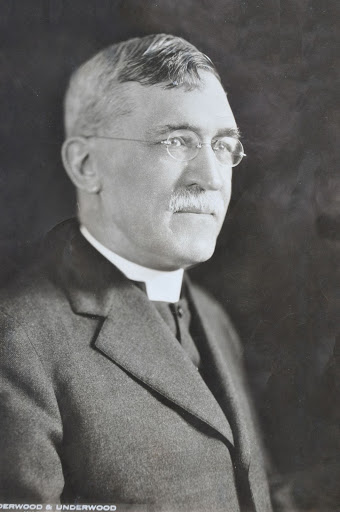Fourth Bishop of Georgia, 1908-1936
(October 23, 1854-December 22, 1936)
 Frederick Focke Reese was born in Baltimore, Maryland on October 23, 1854. He was graduated from the University of Maryland and Berkeley Theological Seminary (at Yale University) before his ordination to the priesthood in 1877. He served as an Episcopal priest in Baltimore, Virginia and for Christ Church in Macon, Georgia before becoming the Rector of Christ Church, Nashville.
Frederick Focke Reese was born in Baltimore, Maryland on October 23, 1854. He was graduated from the University of Maryland and Berkeley Theological Seminary (at Yale University) before his ordination to the priesthood in 1877. He served as an Episcopal priest in Baltimore, Virginia and for Christ Church in Macon, Georgia before becoming the Rector of Christ Church, Nashville.
In February 1908 the Diocese of Georgia met in convention in Augusta to elect the Rev. Frederick Focke Reese as the fourth Bishop of the Episcopal Diocese of Georgia, the first after the diocese was split into the Dioceses of Georgia and Atlanta in 1907. He was consecrated in Christ Church, Savannah on May 20, 1908.
Almost immediately, poor health caused the newly elected bishop to take an extended leave of absence. He resumed ecclesiastical duties April 1, 1909. He is the longest serving Bishop of Georgia. His successor, Bishop Barnwell, said of Reese,
He was the Fourth Bishop of Georgia, which diocese was the whole state until his time. But he was the first bishop of this unconsidered fragment of marshland piney woods and back country which was remote from the rabidly growing industrial section of the north. The Diocese of Atlanta took of the endowments which had been left in the wills of faithful churchmen and women of the Coastal area and even tried to take our name as the Diocese of Georgia. Savannah naturally became the residence of the new bishop of the new diocese. This was back in the early nineteen hundreds. All important railroads radiated from Atlanta. All highways the same. Even at the end of Bishop Reese’s administration there was no paved road from Savannah to the western part of the Diocese. There were local trains on two secondary branches of the Coast Line and Seaboard which arrived at all of the western points in the diocese at two o’clock in the morning and which returned to Savannah at about the same hour. And most of the stations out in the country were reachable by dirt road only.
I have been reading some of the bishop’s earlier expense statements and one item which impressed me was quite a large sum for feed for a missionary’s horse. For the support of his entire missionary work he had much less than we now spend on Camp Reese in a single year.
Again and again he plead, and for a long time in vain, for enough money to raise the salaries of married missionaries to $1,200 a year. $800.00 seems to have been almost the maximum. He had no travel allowance to speak of, he rented his own house, he had nothing to build with in the mission field and his own salary was often far in arrears. We owed him something like $2,500 in back salary when I came to Georgia in 1935. And the depression of 1929 cracked the back of everything. He had built the diocese up from very little to considerable strength when this depression hit, and was building it back again when I came to help him.
He was then past eighty years of age. He was an earliest Christian and a strong Churchman with the zeal of St. John and the patience of Job. For the laying of foundations on which we have built for the last twenty years, I am grateful to Bishop Reese. I have never known his equal in this Church.
During his tenure as Bishop, the missionary work of the Diocese concerned the creation of new missions for blacks. By 1913, there were two predominantly black parishes in the Diocese, St. Athanasius Church, Brunswick and St. Stephen’s, Savannah, as well as thirteen predominantly black missions. He died in Savannah on December 22, 1936.
The Episcopal camp on Saint Simons Island was named in his honor. After that was sold and the camp and conference center was moved to its current location on Honey Creek in Camden County, the dining hall at that new facility was named the Reese Dining Hall for the Rt. Rev. F.F. Reese.
He was succeeded by Middleton Stuart Barnwell as Bishop of Georgia.
